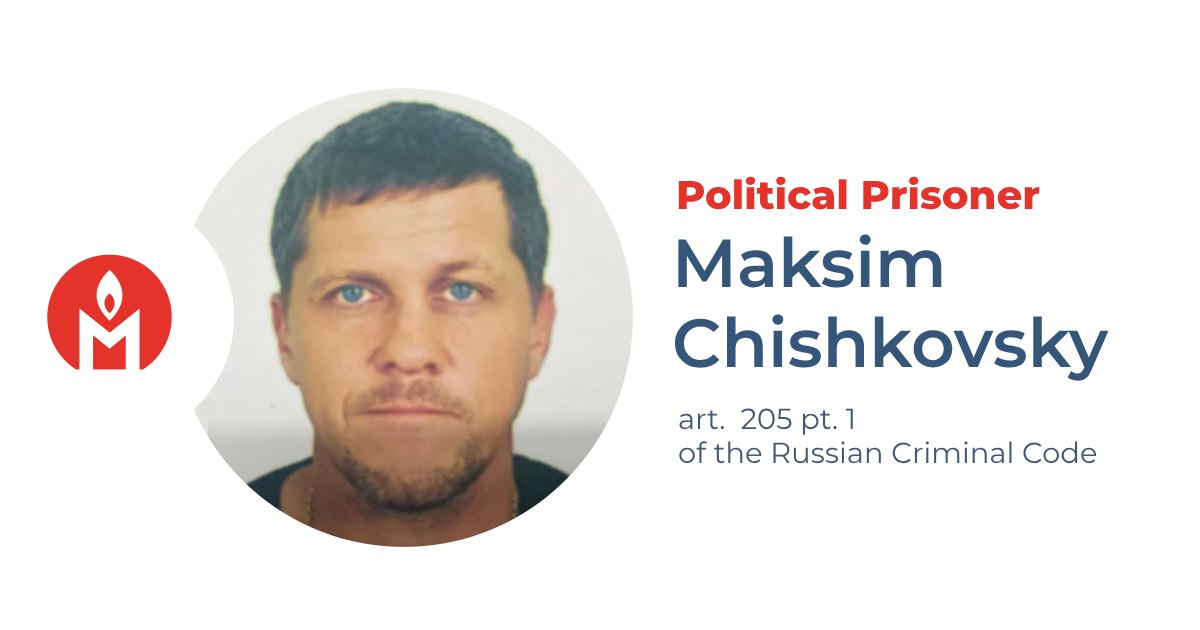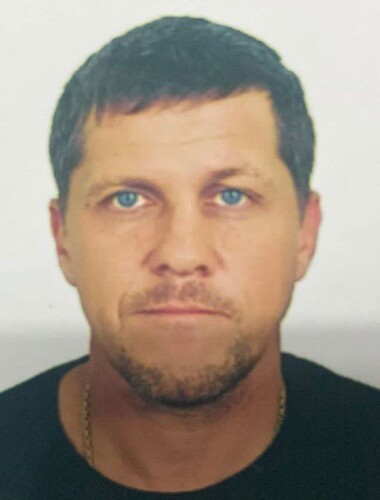Maksim Chishkovsky is a political prisoner
A construction site manager from Vladivostok has been sentenced to 11 years in a strict-regime penal colony on a charge of committing an act of terrorism for setting fire to the window of a military recruitment centre
The ‘Political Prisoners. Memorial’ human rights project, in accordance with international standards, considers Maksim Chishkovsky a political prisoner. He has been convicted on a charge of committing an act of terrorism for an arson attack on the window of a military recruitment centre. Maksim Chishkovsky’s criminal prosecution and conviction violate his right to fair trial. We demand that Chishkovsky’s conviction be quashed, that the criminal charge of committing an act of terrorism be dropped, and that his case be reconsidered in a fair trial.

What were the charges against Maksim Chishkovsky?
Shortly after the announcement of ‘partial’ mobilisation in Russia, Maksim Chishkovsky received a summons from Vladivostok. On the night of 27 September 2022, Chishkovsky smashed a window of the military recruitment centre in Vladivostok with a hammer and threw a Molotov cocktail inside. As a result, the windowsill and window frame caught fire, but the fire was extinguished without calling firefighters.
On 6 October, Chishkovsky was detained and remanded in custody on a charge of committing an act of terrorism (Article 205, Part 1, of the Russian Criminal Code).
On 29 June 2023, a court sentenced Chishkovsky to 11 years’ imprisonment with the first three years to be served in a cell-type prison and the rest in a strict-regime penal colony.
Why do we consider Maksim Chishkovsky a political prisoner?
Chishkovsky’s actions cannot be classified as terrorism. An attempt to set fire to a military recruitment centre is not in itself sufficient grounds for a charge of terrorism. The prosecution did not prove that Chishkovsky had the intention to intimidate the public, which is a necessary element for an act of terrorism.
Chishkovsky committed arson primarily to express his opposition to the war. In one of his letters from prison, Chishkovsky wrote that he ‘had an extremely negative view’ of Russia’s invasion of Ukraine; he did not want to ‘go to kill someone for some reason or other.’ After he received a summons to join the military, Chishkovsky ‘finally decided to show his civic position and commit arson.’
The punishment to which the court sentenced Chishkovsky is wholly disproportionate to the public danger of his actions. Protests against a criminal war and an unwillingness to participate in that war reduce, rather than increase, the public danger of such actions to society.
A detailed description of Maksim Chishkovsky’s case and of our position is available on our website.
Recognition of an individual as a political prisoner does not imply the ‘Political Prisoners. Memorial’ human rights project agrees with, or approves, their views, statements, or actions.
How can you help?
You can write to Maksim Chishkovsky at the following address:
In Russian: 662606, Красноярский край, г. Минусинск, ул. Горького, д. 114, ФКУ Т ГУФСИН России по Красноярскому краю, Чишковскому Максиму Сергеевичу 1980 г. р.
In English: Maksim Sergeevich Chishkovsky (born 1980), Prison, Federal Penitentiary Service of Russia for Krasnoyarsk Krai, 114 Gorky Street, Minusinsk, 662606, Russia.
You can send an email via F-Pismo or ZT (for payment with Russian bank cards) or PrisonMail (for payment with other bank cards).
Please note that letters in languages other than Russian are highly unlikely to reach the recipient.
You can donate to support all political prisoners in Russia.
